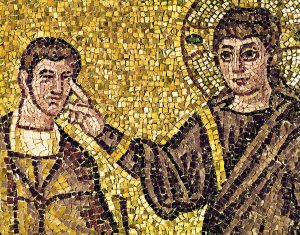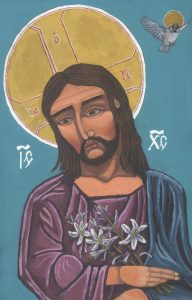 On this Third Sunday after Pentecost, the Church proclaims the Gospel of Matthew (6:22-34). Let us seek the Kingdom of God –together.
On this Third Sunday after Pentecost, the Church proclaims the Gospel of Matthew (6:22-34). Let us seek the Kingdom of God –together.
Our Lord today confronts one of the dilemmas of human life: how do we gain control of our lives? A lot of people want maximum control, but Jesus points out the foolishness of this: “Can any of you by worrying add a single moment to your life span? (v. 27) Of course, we should all strive for some control of our lives, as St. Paul tells us: “We boast of our afflictions, knowing that affliction produces endurance, and endurance, proven character, and proven character, hope. (v. 4)” One of the problems of life, however, is that over-control weakens our faith in God, and trespasses on the welfare of others. One of the most obscene sayings of the present age is Frank Sinatra’s song, “I did it my way.” We don’t have absolute control, St. Paul tells us, “God proves his love for us in that while we were still sinners Christ died for us. (v. 8) and Christ admonishes us, “Your heavenly Fathers knows that you need” food and drink and clothing. (vv. 31-32)
The resolution to this tension is at the end of the Gospel, in the teaching of our Lord, “Seek first the kingdom of God, and all these things will be given to you besides. (v. 33) But what is the Kingdom of God. At his trial, Jesus told Pilate, “My kingdom does not belong to this world. (John 18:36)” This does not mean it is somewhere up there in outer space, but that it is a voluntary sovereignty over our hearts. Governments must impose the laws by external force, they are not concerned with our souls, but the kingdom of God comes from our hearts and minds and souls. Only God can “control” our lives.
“Learn from the way the wild flowers grow. They do not work or spin. But I tell you that not even Solomon in all his splendor was clothed like one of them.(Matthew 6:28-29)”
Meditation by Archpriest David Petras
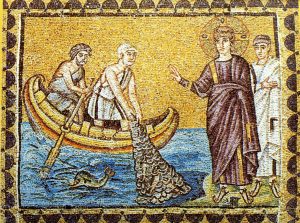 On the First Sunday of the Great Fast, we heard the words from Hebrews, “Therefore, since we are surrounded by so great a cloud of witnesses, let us rid ourselves of every burden and sin that clings to us and persevere in running the race that lies before us while keeping our eyes fixed on Jesus, the leader and perfecter of faith. The whole forty-day journey through the Great Fast, to the Holy Week of our Lord’s Passion, and then through
On the First Sunday of the Great Fast, we heard the words from Hebrews, “Therefore, since we are surrounded by so great a cloud of witnesses, let us rid ourselves of every burden and sin that clings to us and persevere in running the race that lies before us while keeping our eyes fixed on Jesus, the leader and perfecter of faith. The whole forty-day journey through the Great Fast, to the Holy Week of our Lord’s Passion, and then through 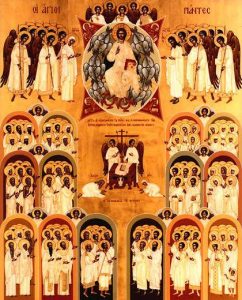 Over the last fifty-some days, we have celebrated the Paschal mystery – the central mystery of our faith, from our Lord’s crucifixion, resurrection, ascension to his sending the Holy Spirit on his followers. This Sunday, after all that has been proclaimed, we add a great “Amen!” “So be it!” This “Amen” will be great only if we make it more than just words but also actions. The Holy Spirit came upon the disciples that they might be witnesses to the Paschal myster
Over the last fifty-some days, we have celebrated the Paschal mystery – the central mystery of our faith, from our Lord’s crucifixion, resurrection, ascension to his sending the Holy Spirit on his followers. This Sunday, after all that has been proclaimed, we add a great “Amen!” “So be it!” This “Amen” will be great only if we make it more than just words but also actions. The Holy Spirit came upon the disciples that they might be witnesses to the Paschal myster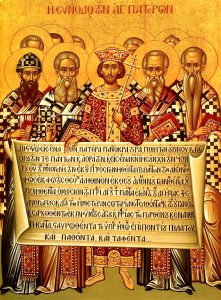 On this Sunday, we commemorate the First Ecumenical Council held in the year 325. This Council defined our faith in Christ, that he was truly God, who had been born of the Virgin Mary as a human being, therefore uniting God and us. The proclamation of faith that they composed is now read at every Divine Liturgy. It was completed in its present form at the Council of Constantinople in 381, with a fuller definition of the nature of the
On this Sunday, we commemorate the First Ecumenical Council held in the year 325. This Council defined our faith in Christ, that he was truly God, who had been born of the Virgin Mary as a human being, therefore uniting God and us. The proclamation of faith that they composed is now read at every Divine Liturgy. It was completed in its present form at the Council of Constantinople in 381, with a fuller definition of the nature of the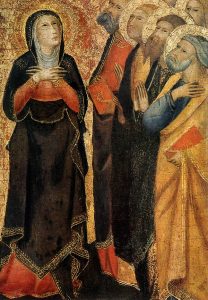 Sunday, 5/28/17 Seventh Sunday of Pascha, Holy Fathers of the 1st Ecumenical Council of Nicea
Sunday, 5/28/17 Seventh Sunday of Pascha, Holy Fathers of the 1st Ecumenical Council of Nicea